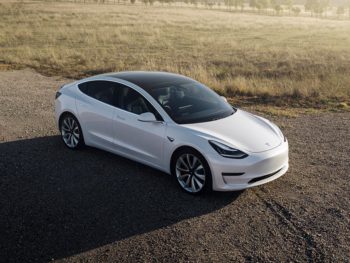Plug-in Grant reductions: The reaction from the fleet and automotive sectors
The Government’s decision to cut the plug-in vehicle grants across cars, vans and trucks and lower the price limit for cars has been branded as a premature move by many across the fleet and automotive sectors.

The AFP has said it’s particularly disappointed around the £35k ceiling on cars, which will hit cars such as the Tesla Model 3
The changes, announced this morning (18 March 2021) and effective immediately, bring reduced funding for drivers making the shift to electric vehicles and means the Plug-in Car Grant is only now applicable to car models under £35k, enabling cars such as the Hyundai Kona 39kWh and the MG ZS EV to still qualify but excluding models such as the Tesla Model 3. There are also reductions in funding for electric vans and trucks.
The Association of Fleet Professionals (AFP) has said it’s “just too much, too soon”.
Paul Hollick, chair, said: “While we have seen massive enthusiasm growing for EVs in the fleet sector over recent months, the whole subject is still very much in its infancy and there is general agreement that the help that the grant scheme provides remains if not essential, then very important.
“We’re especially disappointed around the £35k ceiling on cars. There are a number of models that fleets are adopting in number that will be affected by this. The situation in the van market is even more acute. Fleet adoption of electric vans has barely begun simply because of lack of availability of models and to reduce the grants substantially, just as they are starting to enter production, is a little mystifying.”
Hollick also flagged up the lack of signposting from government.
“We’ve been saying for some time that the 2030 EV target is very much achievable for fleets but that what we need is a clear roadmap over time, especially when it comes to the fiscal basics that affect company cars such as benefit in kind, road fund licence and, in this instance, the EV grant scheme. This change has pretty much come out of the blue and doesn’t do anything to create the kind of stability that we think is needed around the whole subject of fleet adoption of EVs.”
And he added that the fact that all of this takes effect immediately means that orders still in progress will be affected.
“So a business that sent an order for an EV to their leasing company yesterday but which hasn’t yet been placed with the manufacturer will have to be requoted, which is just an unnecessary complication.”
Alphabet also expressed concerns about the timing of the move.
“Whilst it’s understandable that cuts need to be made to support the UK’s deficit, the timing of this is ill-judged and does not support the push towards clean energy or the ban on sales of petrol and diesel vehicles by 2030.
“It’s positive to hear the Benefit-in-Kind (BIK) tax rates remain generous for company car drivers, but this latest news will make the Government’s net zero target much harder to achieve. By providing little advanced warning on these grant changes, the fleet industry will be immediately impacted. Adjusting these figures at a time when decisions on company policies are being made could be potentially damaging to the fleet industry, particularly as it is responsible for the majority of the used car market. There are going to be a significant number of corporate and commercial vehicles currently in the lease co. order process that will now miss out on the Government grant. This will have cost implications for businesses across the UK, at a time when many are trying to recover from the pandemic.”
Ford, which is rapidly ramping up its plans to go electric, also criticised the move.
Chairman of Ford of Britain Graham Hoare said: “Today’s news from the UK Government that plug-in grants for passenger and commercial vehicle customers are being reduced is disappointing and is not conducive to supporting the zero emissions future we all desire.
“Robust incentives – both purchase and usage incentives – that are consistent over time are essential if we are to encourage consumers to adopt new technologies, not just for all-electrics but other technologies too like PHEVs that pave the way to a zero-emissions future.”
And Logistics UK said the measures were not helpful for the logistics sector.
Head of public policy Michelle Gardner said: “Switching to zero and ultra-low emission vehicles is an important focus for the logistics industry, as it works to achieve the government’s zero emissions target by 2050. It is therefore disappointing to see the changes announced today to the Government’s plug in car, van and truck grants, which have been reduced for the vast majority of available models. Logistics UK’s members are committed to making the switch to alternatively fuelled vehicles, but with the market still to reach maturity, options are limited for operators and reducing the financial support will hinder this transition.”
The RAC meanwhile highlighted the possible impact on both the car sector and drivers at large.
Head of roads policy Nicholas Lyes said: “While it’s understandable to focus grants on the affordable end of the market where there’s the best opportunity for greater take-up, the industry has been hit hard by the pandemic and incentives to get consumers to go green remain vital in encouraging the sale of clean new cars. The extent to which drivers might delay upgrading their vehicles as a result of the economic effects of the coronavirus is also yet to be seen, which makes the timing of this announcement all the more surprising.”
He summed up: “By cutting the grant, the Government may risk people holding on to their older, more polluting vehicles for longer.”





